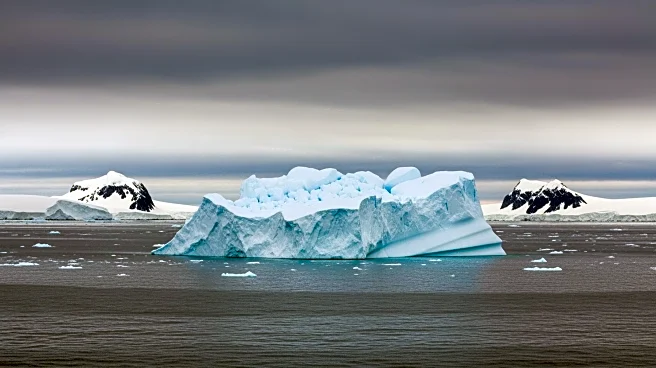What's Happening?
The Hektoria Glacier in Antarctica has experienced a significant retreat, moving back more than 8 kilometers in just two months during late 2022. This rapid change is part of a broader pattern of glacial
retreat observed since the collapse of the Larsen B ice shelf in 2002. The retreat is attributed to the glacier's front destabilizing, a process that has not been observed in modern times. Researchers, led by Naomi Ochwat, are investigating the causes, likening it to a 'whodunnit' mystery. The retreat could have major implications for future sea-level rise, as similar processes could occur in other parts of Antarctica.
Why It's Important?
The retreat of the Hektoria Glacier is significant as it highlights the potential for rapid ice loss in Antarctica, which could contribute to global sea-level rise. If similar processes occur in larger glaciers, such as the Thwaites Glacier, it could lead to substantial increases in sea levels, affecting coastal communities worldwide. The study underscores the urgent need for more data to understand these changes and their implications for climate change and sea-level rise. The findings also challenge previous assumptions about the stability of Antarctic ice and the region's vulnerability to global warming.
What's Next?
Further research is needed to confirm the study's findings and to determine the precise location of the glacier's grounding line. This will help scientists understand whether the retreat is truly unprecedented. The scientific community is divided on the issue, with some researchers questioning the study's conclusions. Continued satellite monitoring and data collection are essential to better understand the dynamics of Antarctic glaciers and to predict future changes. The findings could influence climate policy and efforts to mitigate the impacts of sea-level rise.
Beyond the Headlines
The rapid retreat of the Hektoria Glacier raises ethical and environmental concerns about the impact of human-induced climate change on polar regions. The study highlights the need for international cooperation in climate research and policy-making to address the challenges posed by global warming. It also emphasizes the importance of preserving natural environments and reducing greenhouse gas emissions to mitigate the effects of climate change.










